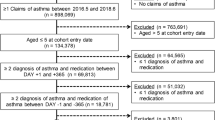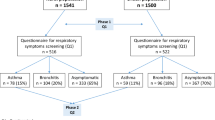Abstract
Asthma is a variable disease, and various factors can lead to an increase (or decrease) in asthma symptoms and the level of asthma control. Pub Med was searched for recent articles dealing with asthma variability, environmental factors and co-morbid conditions that affect asthma control, and for publications which identified tools to facilitate patients' response to asthma variability. Variability in asthma symptoms may be a response to the individual's environment (e.g. seasonal variation, cigarette smoke, and air pollutants) or personal factors (e.g. inhaler technique, pregnancy, exercise). Co-morbid diseases such as allergic rhinitis may also impact significantly on asthma variability and control. Documenting asthma variability and assessing both adherence and possible triggers over time may allow patients and physicians to develop treatment programmes that anticipate, rather than follow, changes in the level of asthma symptoms. Personalised asthma control plans which take into account factors affecting symptom variability may enable patients to modify medication and their environment prophylactically in anticipation of a known trigger or at the first sign of an asthma exacerbation.
Similar content being viewed by others
Article PDF
Author information
Authors and Affiliations
Corresponding author
Ethics declarations
Competing interests
The author is a member of the National Institutes of Health's National Asthma Education and Prevention Program and the National Heart, Lung, and Blood Institute's Expert Review Panel 3 for updating asthma guidelines. She serves on the National Patient and Professional Asthma Advisory Committee for AstraZeneca and the Schering-Plough National Respiratory Disease Leadership Council, and has served as a consultant to Altana Pharma for asthma-related topics. She also has research grants in asthma-related topics from the National Heart, Lung, and Blood Institute, and the Agency for HealthCare Research and Quality and Schering-Plough Integrated Therapeutics.
Rights and permissions
About this article
Cite this article
Yawn, B. Factors accounting for asthma variability: achieving optimal symptom control for individual patients. Prim Care Respir J 17, 138–147 (2008). https://doi.org/10.3132/pcrj.2008.00004
Received:
Revised:
Accepted:
Published:
Issue date:
DOI: https://doi.org/10.3132/pcrj.2008.00004
This article is cited by
-
Causal relationship between lung diseases and risk of esophageal cancer: insights from Mendelian randomization
Journal of Cancer Research and Clinical Oncology (2023)
-
Cyanurchloridbelastung in Produktionsbetrieben
Zentralblatt für Arbeitsmedizin, Arbeitsschutz und Ergonomie (2014)
-
Regular Primary Care Lowers Hospitalisation Risk and Mortality in Seniors with Chronic Respiratory Diseases
Journal of General Internal Medicine (2010)



